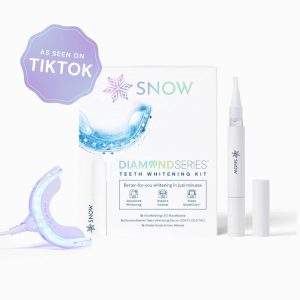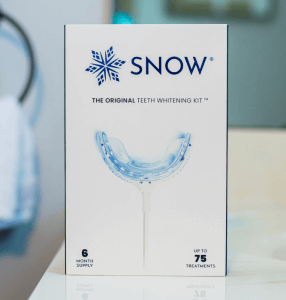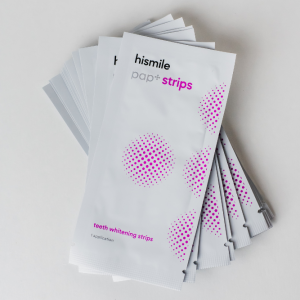Does teeth whitening for sensitive teeth exist? And if so, what are your best options?
This article will discuss everything you need to know about whitening sensitive teeth including the following topics and questions:
- Can you whiten sensitive teeth?
- How to whiten sensitive teeth
- Best teeth whitening kit for sensitive teeth
- What are the best whitening strips for sensitive teeth?
If you want to whiten teeth and avoid sensitivity it’s important to know which ingredients cause sensitivity and which prevent it. But first, let’s start with the causes of sensitive teeth, and how whitening your teeth may trigger pain and discomfort.

- 97% saw real results after a SINGLE USE
- 100% saw results after their full treatment
- No sensitivity
- 30-day money-back guarantee
- 75+ treatments per box!
Teeth whitening and sensitive teeth

If you’re reading this article, it’s likely that you suffer from tooth sensitivity, especially during or after whitening cosmetic procedures. Teeth sensitivity can be an ache during a whitening procedure, or sharp pain when you consume hot or cold food and drinks.
Some of the potential causes of sensitivity include the following:
- Cavities
- Cracked or chipped teeth
- Gum disease
- Damaged or thinning enamel
However, for those with generally healthy teeth, sensitive teeth when whitening can be from bleaching sensitivity and dentin sensitivity.
Sensitive teeth after whitening with bleach
If your teeth are usually sensitive to hot and cold foods and drinks because of thinning enamel, then you’re more likely to experience heightened sensitivity after a bleaching treatment.
During dental bleaching procedures, peroxide, in the form of gels or solutions, comes into contact with the teeth. These peroxide solutions penetrate the tooth structure and break down and remove stains within your dentin. This can cause many patients to experience bleaching sensitivity.
In fact, the reasons why patients experience bleaching sensitivity are still unclear. However, it is believed that the deep penetration of oxidative free radicals generated from peroxide towards the teeth pulp could produce sensitivity. Additionally, the usage of some light sources contributes to increasing the temperature in pulp, causing more discomfort after the procedure.
Fortunately, it’s only temporary and should go away within a couple of days.
Dentin sensitivity after whitening
Dentin sensitivity is a permanent type of sensitivity, unlike the type you can get from bleaching which is temporary. It can happen when stimuli come into contact with areas of your tooth that have exposed dentin.
When your enamel is thin or dentin is exposed, the peroxide in the bleaching solution can penetrate your dentin, causing pain, sensitivity, or discomfort.
Can I get my teeth whitened if I have sensitive teeth?
Even if you experience sensitivity, don’t worry, teeth whitening is still an option for you. Just make sure to look for solutions that are specifically targeted towards people with tooth sensitivity.
Thankfully, there are plenty of options available such as:
We’ll go over all of these, but first, let’s look at the main whitening ingredients.
Teeth whitening ingredients

There are myriad ingredients used for lightening tooth colour, some more effective than others.
The ingredients that are perhaps the most effective may cause the most sensitivity. But, some of these systems provide a solution by including ingredients that help prevent or decrease sensitivity.
Let’s take a look at the ingredients that can cause sensitivity and the ingredients that can relieve it.
Teeth whitening ingredients that trigger teeth sensitivity
Peroxides are one of the most effective and commonly used teeth whitening ingredients. But, they are suspected to be the primary culprit when it comes to teeth whitening sensitivity. Usually, it’s in the form of hydrogen peroxide, although carbamide peroxide is sometimes used as well.
Peroxide passes through the tooth and actually changes the colour. Hydrogen peroxide is a weak acid that has oxidizing properties, allowing it to take apart complex stain molecules. A side effect of using it to whiten teeth is that it releases free radicals while it works which can cause damage to your enamel and gum tissue.
Usually, the pain, sensitivity, or discomfort experienced during or after a whitening procedure is only temporary. However, in cases where the whitening agent isn’t applied correctly or for too long, it can damage the enamel permanently.
Teeth whitening for sensitive teeth in the UK
Some ingredients used in whitening toothpaste and whitening systems are meant to prevent or decrease tooth sensitivity. Fluoride is one of the ingredients that dentists use to strengthen enamel and reduce pain. They apply it straight to your teeth for a short amount of time to treat your teeth.
Sensodyne, one of the most popular brands of toothpaste for sensitivity includes the ingredient potassium nitrate to soothe the nerves inside your teeth and stannous fluoride to strengthen enamel.
The best whitening toothpaste for sensitive teeth is one that not only whitens your teeth but also remineralises and desensitises them at the same time.
Hismile’s PAP+ Whitening Powder has the ability to make any toothpaste into a whitening toothpaste. It uses their PAP+ formula which helps to desensitise and remineralise teeth enamel as it whitens.
There are also products and professional in-office teeth whitening services that are designed specifically for those who have teeth whitening sensitivity. These treatments usually come with some sort of desensitising gel or serum and are applied prior to a bleaching procedure. Desensitising substances based on phosphate such as (DCPA) and (TTCP) have reported successful results in preventing sensitivity.
Have a look at the video below where Dr Chhaya Chauhan explains teeth sensitivity when whitening your teeth and tips for managing it.
Best teeth whitening for sensitive teeth
When it comes to whitening sensitive teeth, there are plenty of options, but not all of them are created equal. Let’s have a look at some of the most popular (and why) to help you decide which is best for you.
Snow Teeth Whitening Kit
Snow professional teeth whitening systems are produced in the USA and use hydrogen and carbamide peroxide in a formula designed to be suitable for sensitive teeth.

Rather than applying the gel using mouth trays, Snow’s revolutionary system lets you paint the serum directly onto your teeth. This means it uses a lot less gel and there is no risk of it squirting out and damaging your gums.
Included in the basic Snow home whitening kit is:
Snow’s Teeth Whitening Kit
- A mouthpiece with built-in LED lights
- 3 whitening wands (1 wand = 21 treatments)
- 1 extra-strength whitening wand
- Teeth whitening progress tracker
Check out our full write-up of Snow for more details, or read about the wireless kit.
Hismile PAP+ Whitening Strips

If you want a more convenient sensitive teeth whitening solution for when you’re on the go, Hismile’s PAP+ Whitening Strips may be the option for you.
Hismile’s Whitening Strips are some of the best whitening strips for sensitive teeth because they are based on the same PAP+ formula used in all Hismile’s Teeth Whitening products. So, you should not experience any teeth sensitivity or gum irritation at all.
In each pack of whitening strips, you get 14 treatments or 28 strips for both your upper and lower teeth. They boast fast results after just one treatment at the same time as desensitising and remineralising your teeth.
You won’t get as good results with the strips in comparison to a whitening kit like SmileAvenue’s, but they are still an effective whitening solution. And, you might find you prefer strips to kits because they fit your lifestyle better.
Conclusion
If you have sensitive teeth but really want to whiten them, there are ways to do so without triggering any sensitivity. Whitening treatments specifically designed for sensitive teeth mean that you can get a brighter smile without any pain or discomfort.
There are plenty of options you can try that are made specifically to give people with tooth sensitivity a brighter smile. In this article, we reviewed three options that we think are some of the best whitening for sensitive teeth options. You may want to try them out to see if they work for you.
Both Hismile and Snow have products available that enable you to whiten your teeth without sensitivity while remineralising your teeth.
Hismile has a range of products all using its PAP+ formula. So, you have options, you can choose which one works best for you or you can opt for the HiSmile complete whitening bundle, which includes their range of whitening products. Not everyone has time to use a whitening kit, So Hismile give you the option of strips or whitening powder to use with your regular toothpaste!
You should always remember, however, that a healthy smile comes in many shades; your teeth don’t need to be Hollywood white to be in tip-top condition. As long as you brush twice a day, floss at least once a day, and visit your dentist at least once a year, you should have a smile to be proud of.
FAQs
Why are my teeth sensitive to whitening?
Your teeth may be sensitive because of the bleaching agent, peroxide, that is used in most whitening systems. If this is a problem for you, try a peroxide-free whitening system.
Both Hismile and Snow have PAP as the main ingredient in their whitening gels which shouldn’t cause sensitivity, and actually strengthens and desensitises as you use it.
How long does teeth sensitivity last after whitening?
Sensitivity from teeth whitening usually only lasts up to 48 hours after a whitening procedure. To relieve symptoms, you should use toothpaste or serum that helps reduce sensitivity. Your dentist can recur to a preventive method or prescribe a toothpaste or medication to reduce post-bleaching discomfort.
Can I get my teeth whitened if I have sensitive teeth?
Yes, it’s possible, but you should look for products marketed specifically for tooth sensitivity. Some use gentle ingredients, and others come with desensitising serum.
What is the best teeth whitening product for sensitivity?
Hismile and Snow both make effective whitening products for teeth with sensitivity. They both deliver noticeable results without peroxide and remineralise your teeth while whitening.
Mcgill.ca: How Does Peroxide Whiten Teeth? Consulted 24th August 2020. PubMed: Dentin hypersensitivity after teeth bleaching with in-office systems. Randomized clinical trial. Consulted 24th August 2020. PubMed: Pretty painful: Why does tooth bleaching hurt? Consulted 24th August 2020.




